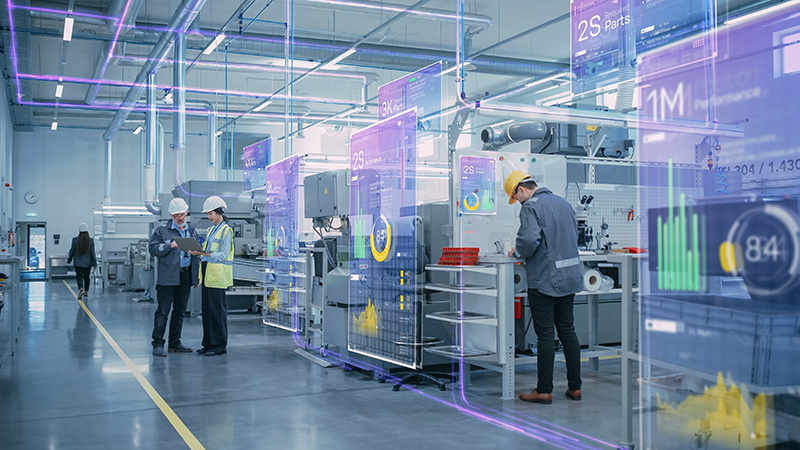
UK manufacturers risk missing out on productivity gains due to a lack of confidence in digital technologies, according to a new report, with just 16% considering themselves ‘well-informed’ about the potential uses of AI.
The lack of understanding and confidence in AI applications, revealed in “Factories of the future powered by AI”this means that only a third (36%) of companies use it in their manufacturing operations.
Based on a survey of 151 businesses conducted in August, the report was published today (November 25) by manufacturers’ organization Make UK and engineering software company Autodesk.
Despite the low level of trust, AI – including machine learning and generative AI – is increasingly deployed in multiple areas, from predictive maintenance to supply chain optimization. Increased efficiency is the top benefit, according to 69% of respondents, followed by improved productivity (61%) and automation of routine tasks (46%). Three-quarters of companies plan to increase their investments in AI in the coming year.
“AI and automation are driving dramatic changes in accelerating manufacturing processes and elsewhere in businesses. Their potential to drive economic growth and reshape industries is becoming increasingly evident, and the manufacturing sector and its factories of the future have a central role to play,” said Verity Davidge, policy director at Make UK.
“However, as adoption of these technologies increases, the UK needs a step change in the use of automation, otherwise it risks missing out on essential transformative productivity gains.”
A quarter of companies are using AI as part of their decarbonization efforts, according to the report. Of these, more than nine in ten (93%) use it to optimize energy consumption, almost two thirds (64%) to reduce waste and emissions, and more than half (57%) to improve resource efficiency.
AI, however, has its own high energy costs, leading to widespread concerns about its impact on sustainability efforts. The implementation of AI can increase the energy demand of search tools such as Google, according to the International Energy Agencywhich also predicts a doubling of electricity consumption in data centers, AI and cryptocurrencies between 2024 and 2026.
Competency issue
Large businesses are more than twice as likely as small and medium-sized businesses (SMEs) to apply AI (71% and 28% respectively), according to the Make UK and Autodesk report, with barriers to adoption, notably a lack of knowledge on how to proceed. apply AI and limited access to technical and digital skills.
A recent survey conducted by Professional engineering and IMechE found that engineers will need new skills and specializations to thrive in AI-powered businesses, including coding and rapid engineering.
This report, which reveals that more than two-fifths of organizations surveyed use AI or AI-related tools, identifies reduced human oversight, cybersecurity risks and bias in decision-making as the most important aspects. most negative of its introduction.
Robot block
Even as AI adoption increases, the new report shows that the use of robotics remains low. Less than a fifth of manufacturing companies (16%) operate them, with almost a third (29%) not considering using them, and only four in ten (38%) considering it. The UK ranks 24th in the world for the use of robotics, with 111 robots per 10,000 employees, or 0.5% of the global number of robots in manufacturing, compared to 1.2% in France and 1 .6% in Italy, which have industrial bases of similar size.
Make UK welcomed the Government’s initiatives, including confirmation of the Made Smarter program nationally and a doubling of funding for Alan Turing Institute.
“However, given the scale of the barriers that remain for SMEs in particular, the industry itself must make greater efforts to overcome awareness and cultural challenges within organizations by sharing learning between peers and best practices,” the organization said.
He also suggested additional measures from the government, including extending the R&D tax break to cover investments in capital goods.
Srinath Jonnalagadda, vice president of industry strategy for design and manufacturing at Autodesk, said: “Leveraging new technologies is not a one-time investment or the silver bullet for change. This requires a mindset shift and an iterative approach over time, especially in the journey to future digital factories.
“A continued and concerted effort will be required to achieve industry transformation and a workforce with the skills and capabilities required to take advantage of new technologies, enabling UK industry to become a leader world leader in AI-driven innovation, setting the new standard in manufacturing. Excellency.”
READ: “Promise and peril as engineering companies deploy AI”
Want the best engineering stories delivered straight to your inbox? The Professional Engineering newsletter gives you vital updates on the most cutting-edge engineering and exciting new job opportunities. To register, click here.
Content published by Professional Engineering does not necessarily represent the views of the Institution of Mechanical Engineers.


